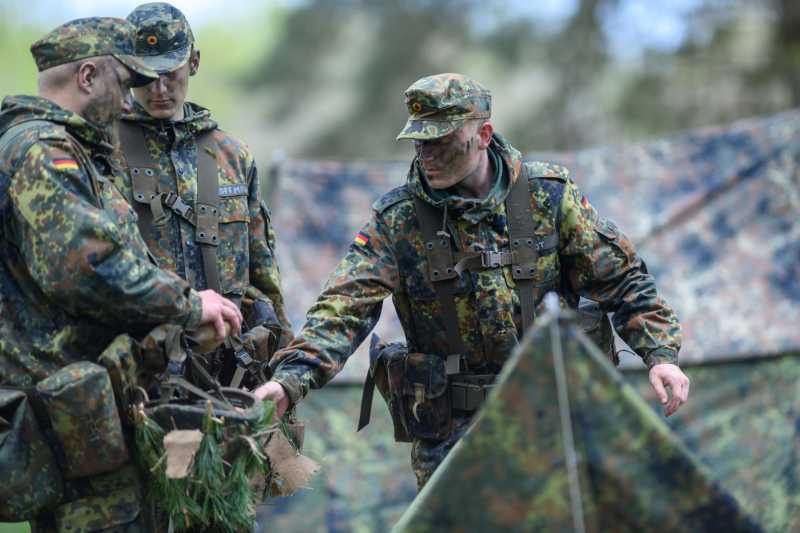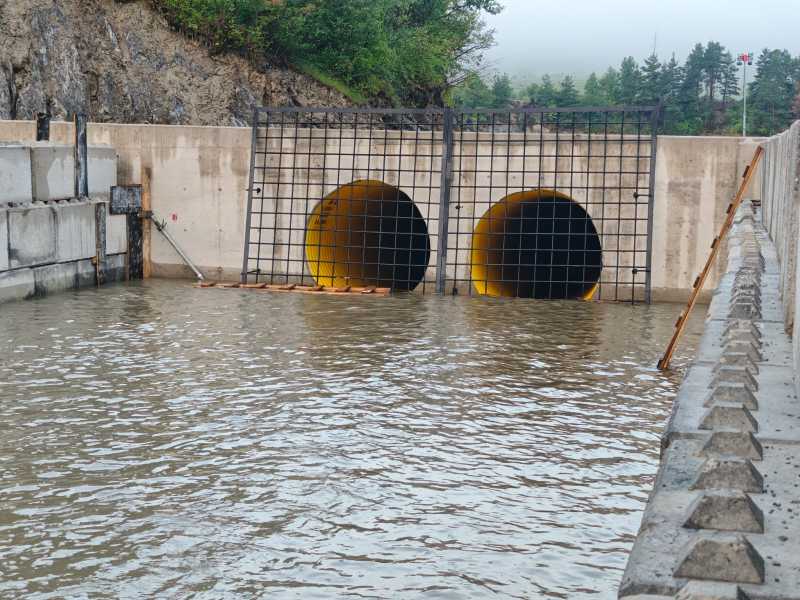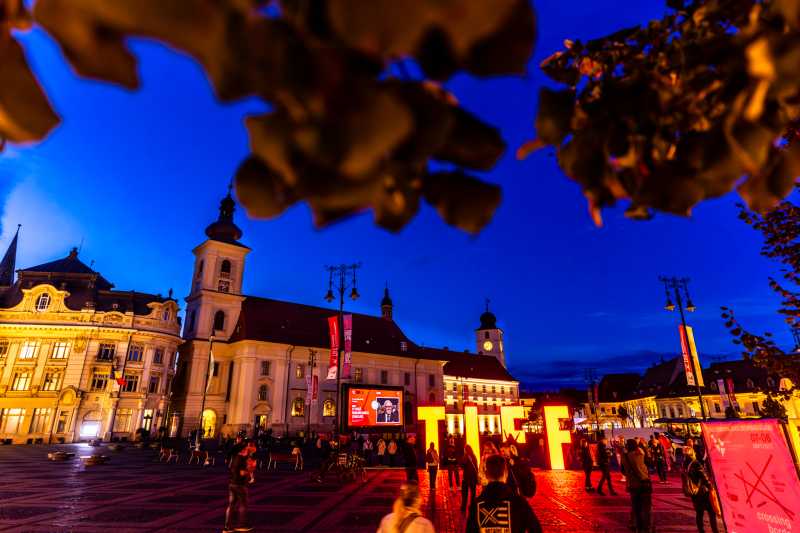The return of conscription? EU countries debate bringing back military service (enr)

Since the end of the Cold War many European countries ditched conscription, but with a major shift in geopolitics and increasing instability, could young Europeans soon expect to face a call up to the military?
Russia's full-scale invasion of Ukraine, growing instability in the Middle East, and Donald Trump's return to the White House have thrust European defence policy into the spotlight and made Europe rethink its military recruitment models.
Last month, NATO member countries agreed to increase their defence and security-related spending to 5 percent of Gross Domestic Product (GDP). But increased spending alone without the manpower to back it up could undermine Europe's military preparedness.
This shift has caused the topic of military conscription to become the subject of political debate across the continent.
A recent poll of nine European countries by the European Council on Foreign Relations found that in several countries, including France, Germany and Poland, majorities support reintroducing mandatory military service, although in the case of the latter two this support disappears in the 18-29 age group.
In some European countries conscription still exists
Many EU countries abolished or suspended the policy of mandatory service in the armed forces following the end of the Cold War, while in others it was maintained with varying time commitments and rules.
Nine member states currently have conscription (Austria, Cyprus, Denmark, Estonia, Finland, Greece, Latvia, Lithuania and Sweden).
Croatia will soon join this group after previously abolishing compulsory military service in 2008. Basic military training lasting two months will begin in January 2026, and those who file for conscientious objection due to religious or moral reasons will have three months of training in civil protection or undergo four-month training in local units.
Conscripts will be paid 1,100 Euro net per month, and their meals, transportation, leave and other costs will be covered. The service counts toward employment history, and employed conscripts cannot be fired due to their service. Unemployed conscripts will also have hiring preference in state and local government institutions.
Countries with conscription apply different models: mandatory service for all eligible citizens, lottery-based systems when volunteer numbers fall short, or selective conscription based on motivation and skills.
Which countries in Europe are considering to (re-)introduce conscription?
Several European countries that have suspended conscription rely on volunteers to bolster numbers. In response to the security threat posed by Russia, the German military - the Bundeswehr - is seeking to recruit at least 60,000 more soldiers.
This has led to a renewed debate over whether compulsory military service is needed in Germany, more than a decade after it was suspended.
Chancellor Friedrich Merz said last week that he believes it likely will be. 'The Bundeswehr must return to the centre of our society,' he said. 'It was a mistake - as we know today at the latest - to suspend compulsory military service.'
However, under the social democratic SPD's coalition agreement with Merz's conservative bloc, the new German government has committed to seeking voluntary military service. The SPD had come under pressure over this agreement, but on Saturday, the party approved a motion at its national conference which said: 'We do not want any legal option to call up conscripts that can be activated before all measures for voluntary increases have been exhausted.'
'We want to enable measures to recruit, register and keep track of young men liable for military service,' it stated.
Portugal is another country that has seen a debate over conscription gain traction recently.
Proponents argue that it promotes civic spirit, social cohesion, and better prepares society to face crises. Critics, however, point to the high logistical costs, the impact on individual freedom, and the need to modernise the Armed Forces with highly qualified professionals instead of mass conscription.
Compulsory military service was a defining reality for much of the 20th century in the country, when, from the First Republic between 1910 and 1926 until the late 1990s, thousands of young Portuguese men were called up to fulfil what was known as their 'civic duty to the nation'.
In 2004, mandatory military service was abolished, giving way to a professional volunteer model that remains in place today.
Currently, the Portuguese Armed Forces recruit young people through voluntary enlistment or fixed-term contracts, with service periods ranging from six months to six years.
One aspect that remains from the era of compulsory service is the National Defence Day. It's a one-day event aimed at raising awareness about the Armed Forces and national defence among young people. While it involves no military training, participation is mandatory for Portuguese citizens usually once between the ages of 18 and 30 and is a prerequisite to access certain civil rights, such as getting a passport or applying for public sector jobs.
Bulgaria, once one of the most militarised states in the former Eastern Bloc, has relied on a professional army since ending conscription in 2008 - but now faces a 21.8 percent staffing shortfall. With recruitment lagging despite recent pay raises, Defence Minister Atanas Zapryanov said limited compulsory training is under consideration, especially for firearm-related roles. Full conscription isn't planned, but could return if enlistment continues to fall short.
In Romania, compulsory military service was suspended on January 1, 2007, with the accession to NATO and the EU. According to the legislation, in case of war, Romania can reactivate the compulsory military service. All citizens can be enlisted, including those who have not completed their military service.
After the start of the war in Ukraine, there were discussions, especially online, about a possible partial or voluntary reintroduction of military service, but the Ministry of Defence rejected the idea, pointing out that it is preferable to expand the volunteer reserves and improve the selection base.
In Poland, Prime Minister Donald Tusk announced in early March that he wanted to reinstate a form of military service, with a target of 100,000 people participating per year.
France has also reopened the debate. Military service was suspended in 1997 under the presidency of Jacques Chirac. The public debate on military service was reignited when Emmanuel Macron announced a ‘major overhaul' of universal national service (SNU) in an interview with the regional press in March. Reinstating compulsory military service (for men and women) would currently represent an annual budget of 15 billion Euro, according to a recent policy note from the Haut-Commissariat à la Stratégie et au Plan - France's High Commission for Strategy and Planning.
In Belgium, conscription has been suspended since 1993. It has not been abolished though, so in theory it could be reactivated via an amendment on the law.
Since the beginning of the Russian invasion in Ukraine, there have been some conversations about reintroducing the mandatory conscription, but they have not led to any initiatives. Public opinion doesn't seem to be in favour of it, and according to the Minister of Defense Theo Francken, Belgium isn't logistically ready for a reintroduction, because of a lack of personnel, barracks and beds.
The current government did announce the introduction of a voluntary military service of one year, for which every 18-year-old will receive an invitation letter. The plan is to start in September 2026 with a first group of 500 volunteers and the government hopes to achieve a yearly intake of about 1,000 new recruits by 2028. Volunteers will receive a monthly salary of around 2,000 Euro.
Which states in Europe are against conscription?
While the debate is open in many European countries, others are clearly not keen on the idea. In Spain, Defence Minister Margarita Robles ruled out in March 2024 that Spain would reinstate compulsory military service in response to the possibility that the Russian threat to Ukraine could spread to other European countries. 'There will be no military service in Spain, absolutely none, and I don't think it has crossed anyone's mind,' she said in a statement.
Slovenia is also not considering conscription at this time despite shortages in the armed forces, according to the Ministry of Defence.
Defence Minister Borut Sajovic said he was monitoring developments in countries that were taking steps in this direction. 'Everywhere it seems that conscription is not a magic bullet or a magic wand,' he added.
Slovakia has also ruled it out, with Prime Minister Robert Fico and other officials insisting on voluntary alternatives amid years of unsuccessful recruitment efforts. Defence leaders and experts, including former minister Martin Sklenár, agree that a new model is needed, with proposals such as financial incentives and reforms to the reserve system currently under discussion.
Albania is another country in no rush to bring back conscription. In November 2010, the parliament passed a law abolishing it which paved the way for the creation of a professional and modern army. This change came after a long period of compulsory service that had begun in 1968.
In Ireland, the idea of introducing military conscription is not on the political agenda. The country has never had conscription since its independence over 100 years ago.
Gender debate in connection with mandatory military service
Within the conscription debate it is being discussed whether it should apply to both men and women. Women make up around 13 percent of the armed forces, according to a 2023 survey of 12 European countries.
Within the EU, conscription currently applies to both men and women only in Sweden and Denmark.
The Danes introduced this measure starting from July 1. This means that women who turn 18 after that date will be conscripted during 2026 and will be assessed for military service on an equal footing with men. According to Defence Minister Troels Lund Poulsen from the liberal party Venstre, the increase is due to the fact that 'we must work hard to defend our homeland'.
'We simply have to get more men and women who are able to bear arms,' said Poulsen in a speech in June.
As Europe faces its most serious security test in decades, governments are rethinking not only their defence budgets, but the role of ordinary citizens in protecting the continent. Whether through compulsory service, voluntary models, or something new entirely, the coming years will likely reshape the connection between civilians and the military across the EU.
The content of this article is based on reporting by AFP, Agerpres, ATA, Belga, BTA, dpa, EFE, HINA, LUSA, Ritzau, STA, TASR, as part of the European Newsroom (enr) project. AGERPRES (editing by: Simona Klodnischi)
The content of the www.agerpres.ro website has the exclusive purpose of public informing.
All the information published on this website by AGERPRES is protected by relevant legal dispositions.
It is forbidden to copy, reproduce, recompile, decompile, distribute, publish, display, modify, create derived components or products or full services, as well as any exploitation of the site's content.
Details in the section Terms of Use. If you are interested in picking up AGERPRES news items, please contact the Marketing Department – [email protected].
The use of the Comments section entails your obligation to respect the AGERPRES terms and conditions in regards to the publishing of comments on the www.agerpres.ro.
Other news in category
President Dan: We are tempted to avoid responsibility, while there is still discrimination in Romanian society
President Nicusor Dan on Thursday stated that there is still discrimination in Romanian society, while people tend to avoid responsibility. He participated in the ceremony marking the European Day of Commemoration of the Victims of the Holocaust against the Roma. 'May God forgive them! It is our obligation to know our history and to assume o
Foreign Affairs: Romania supports civil population in Gaza Strip through new medical evacuation operation
The Foreign Affairs Ministry (MAE) participated on Wednesday in a new emergency medical evacuation operation from the Gaza Strip, in collaboration with the National Defence Ministry (MApN) and the Ministry of Interior (MAI), as well as with other institutions of the Romanian state and dedicated structures of the European Commission. According to a MAE press re
Electrica's successful maiden bond issue - proof public capital companies are attractive, EnergMin says
The money raised from the listing of Electrica bonds will be used to strengthen Romania's electricity production capacities, Energy Minister Bogdan Ivan said on Wednesday, as he participated in the event that marked the trading debut of the electric power company's first bond issue. 'I believe that today's event marks an extremely important mom
Lifting restrictions on liquids in carry-on luggage - only at airports with new certified detection algorithm (SRI)
The Romanian Intelligence Service (SRI) announced on Wednesday that the lifting of restrictions on liquids in carry-on luggage will only be done at airports where the new certified detection algorithm will be installed. 'The recertification, at European level, of a model of security control equipment also used in airports in Romania has created the premise
CSM refuses opinion on magistrates' pensions bill, argues PM is not competent to initiate such a move
The Supreme Council of Magistrates (CSM) announced on Wednesday that it cannot issue an opinion on the government's legislative draft regarding the modification of the magistrates' retirement age and the pensions they are entitled to, because the prime minister is not competent to initiate such a move. In a release, the CSM indicates that the 'cons
Romania currently exceeds the EU average absorption rate of 11.4%, reaching 16.3% (minister Pislaru)
Romania has an absorption rate of European funds of 16.3% and is currently above the European Union average of 11.4%, said on Wednesday the Minister of Investments and European Projects, Dragos Pislaru, who took stock after his first month in office. 'According to the latest data from the European Commission, Romania currently exceeds the EU average absorp
Nicusor Dan: There is Russian hybrid war in Europe; Romania can offer technical expertise to Moldova
President Nicusor Dan declared on Wednesday that there is a Russian hybrid war in Europe, noting that, in view of the parliamentary elections in the Republic of Moldova, Romania can offer the neighboring country technical expertise on several components, such as cybersecurity. 'Again I return to those July 18 press releases from NATO, the European Union an
President Dan: It is utterly absurd for magistrate's pension to equal salary under current law
President Nicusor Dan criticized the current legislation on Wednesday, calling it 'utterly absurd' that a magistrate's pension could equal their full salary upon retirement. The president announced on Wednesday that he has received 76 retirement requests from magistrates. Of these, two have withdrawn their applications, while in two other cases, sp
UPDATE/President Dan says people's confidence in Romanian state comes from confidence in state's interface
People's confidence in the Romanian state comes from the confidence that they have in the state's interface, president Nicusor Dan conveyed on Wednesday to the young graduates of the Police Academy. The head of the state attended the ceremony awarding the rank of second lieutenant/sub-inspector of police to graduates of the 'Alexandru Ioan Cuza'
Gov't: Romania sends European Commission portfolio for funding projects under SAFE mechanism
Romania sent to the European Commission a portfolio of projects meant for the development of the defence industry and increase of military mobility, through the Security Action for Europe (SAFE) mechanism. According to a Government press release, approximately 70pct of the projects attached to the application submitted by Romania include purchases of military
Builders finalise Corund stream diversion works near Praid flooded salt mine
Works to fully divert the Corund stream through a corrugated pipe system installed in the Praid area - Harghita County were completed on Monday in a one-off project designed for handling the emergency situation generated by the flooding of the local salt mine. Investment director of the National Salt Company, Nicolae Sebastian Soltuz, declared that the water w
Senate's head Abrudean says time has come to definitively close era of privileges
The President of the Senate, liberal Mircea Abrudean, believes that Romania needs stability through courageous reforms, stating that ''the time has come to definitively close the era of privileges''. 'I support the steps announced by Prime Minister Ilie Bolojan, both regarding the reform of special pensions and the streamlining of state-own
Historical-military reenactments, ceremonies honoring national heroes, at the Arch of Triumph, August to December
Historical-military reenactments and ceremonies honoring national heroes will take place from August to December at the Arch of Triumph in the Romanian capital. According to a press release sent to AGERPRES on Tuesday, the Cultural Center 'Brancoveanu Palaces at the Gates of Bucharest' and the Military Tradition Association (a Romanian reenactment grou
Camelia Potec elected to World Aquatics Executive Board
At the World Aquatics Congress in Singapore, where the World Swimming Championships are taking place these days, president of the Romanian Swimming and Modern Pentathlon Federation (FRNPM) Camelia Potec was elected on July 29 to the World Aquatics Executive Board. ''It's a moment of joy for me. It wasn't a personal ambition, but a mission I emb
TIFF returns to Sibiu, August 7-10, with open-air screenings, Romanian film premieres, special guests
The 19th edition of the Transilvania International Film Festival (TIFF) returns to Sibiu from August 7 to 10, featuring open-air screenings in Piata Mare (Large Square) - with free admission, and film events hosted at CineGold and the German Forum, informs a press release. This year's program includes a mix of international titles and the latest Romanian p
















